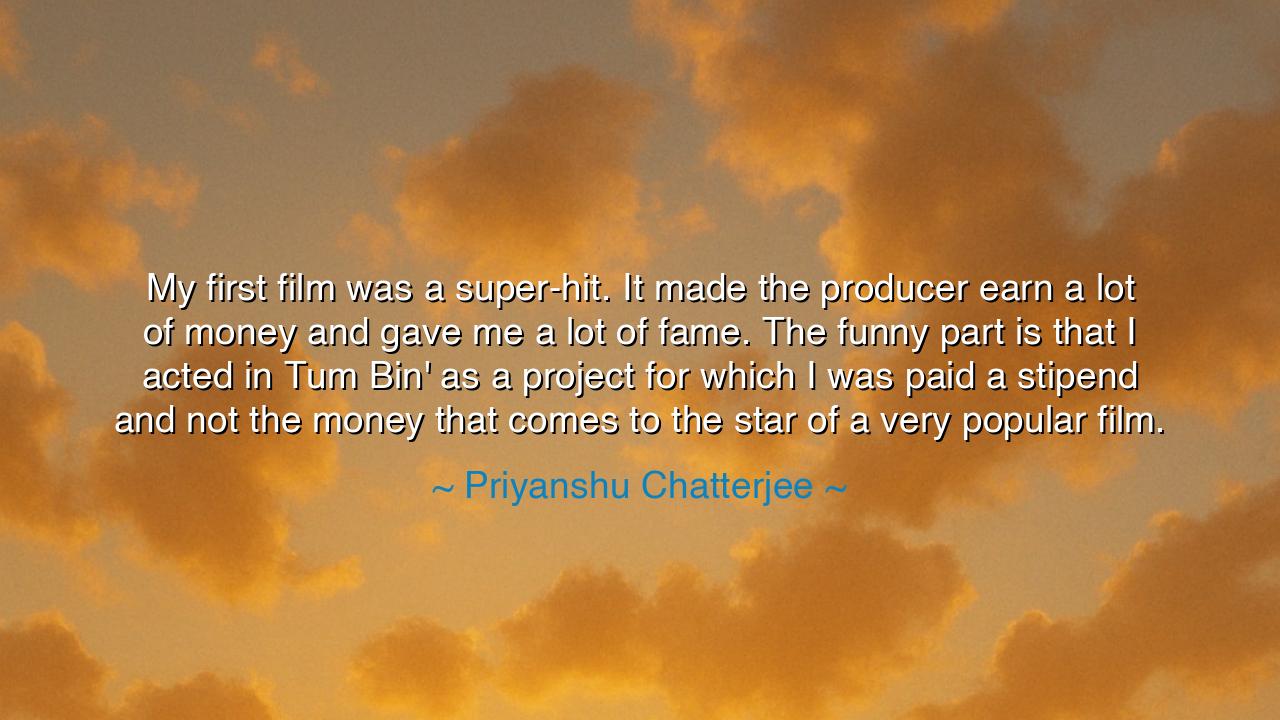
My first film was a super-hit. It made the producer earn a lot of
My first film was a super-hit. It made the producer earn a lot of money and gave me a lot of fame. The funny part is that I acted in Tum Bin' as a project for which I was paid a stipend and not the money that comes to the star of a very popular film.






“My first film was a super-hit. It made the producer earn a lot of money and gave me a lot of fame. The funny part is that I acted in ‘Tum Bin’ as a project for which I was paid a stipend and not the money that comes to the star of a very popular film.” — thus spoke Priyanshu Chatterjee, an artist whose reflection carries not merely irony, but deep wisdom about the ways of fortune and the unpredictable nature of human destiny. In these words, one hears both gratitude and humility — the voice of a man who has seen how success does not always walk hand in hand with reward, and how the path of art often yields riches of the soul long before it offers wealth of the world.
The story of ‘Tum Bin’, released in 2001, is one known to many who remember its quiet rise from modest expectations to immense success. It was a film born not from grand budgets or famous names, but from sincerity and emotion. Priyanshu Chatterjee, then a newcomer, did not stand upon the pedestal of stardom, nor did he demand the spoils of fame. He entered the film humbly, as one undertaking a project, not a conquest. Yet the irony — that the film became a “super-hit,” enriching its producer while he received but a stipend — reveals the strange, almost poetic law of the universe: that reward does not always follow labor immediately, and that greatness often begins in quiet, uncelebrated effort.
There is an ancient truth hidden within this modern tale. The philosopher Epictetus once said, “Do not seek to have events happen as you wish, but wish them to happen as they do, and you will go on well.” Priyanshu’s words echo this stoic wisdom. Though others gained more from his success than he did, he does not speak with bitterness, but with wonder. “The funny part is…” he says, as if to remind us that life’s ironies, when met with grace, become not wounds but lessons. The laughter in his tone is not of scorn, but of acceptance — a recognition that the artist’s true reward is not measured in coins, but in the immortality of his work.
In every field of creation, history tells of those who labored in obscurity while others reaped the gold of their genius. Vincent van Gogh, whose paintings now hang as priceless treasures, sold only a single artwork in his lifetime. He died poor, yet his art became eternal. Priyanshu’s story, though far less tragic, touches the same thread — that value is often unseen at first, that destiny tests the heart through imbalance. To create for passion rather than profit is to walk the road of the ancients — the road of those who gave their craft to the world before the world was ready to pay its due.
Yet in his words there is not sorrow, but freedom. “It gave me a lot of fame,” he says, and that is no small thing. Fame, or rather recognition, is not mere vanity; it is acknowledgment from the world that your creation has touched its heart. The irony of the stipend becomes almost symbolic — a reminder that one’s worth is not always known even by those who benefit from it. In the end, he stands as the living embodiment of a timeless truth: that the seeds of greatness are often sown in fields where no one yet sees their bloom.
The meaning of his reflection, then, is not a complaint against injustice, but a celebration of patience and perspective. Life does not always reward us in the currency we expect. Sometimes the artist is paid not in wealth, but in wisdom — not in comfort, but in character. To work with sincerity even when reward seems small is to place one’s faith in time itself, which alone can measure true worth. For what begins as a humble project may, through dedication and grace, become a legend that outlives its maker.
Let this, then, be the lesson: labor not for immediate gain, but for excellence. Give your craft your whole heart, even when the world does not yet see its value. Accept irony as the universe’s gentle laughter — for what is yours will find its way to you in time. Be content to earn fame through integrity, and let fortune follow at its own pace. The wise do not demand reward before their work is done; they sow their effort into the soil of eternity, knowing that every act of true creation bears fruit in its season.
Thus spoke Priyanshu Chatterjee, not as one bitter at fate, but as one who understood it. For in his humility lies the soul of every true artist — the one who works not for what he receives, but for what he becomes. His story is a gentle reminder to all generations: that the world may delay its payment, but it cannot deny its debt to the sincere. The stipend may fade, the coin may pass, but the art — the thing done with pure heart — endures forever.






AAdministratorAdministrator
Welcome, honored guests. Please leave a comment, we will respond soon